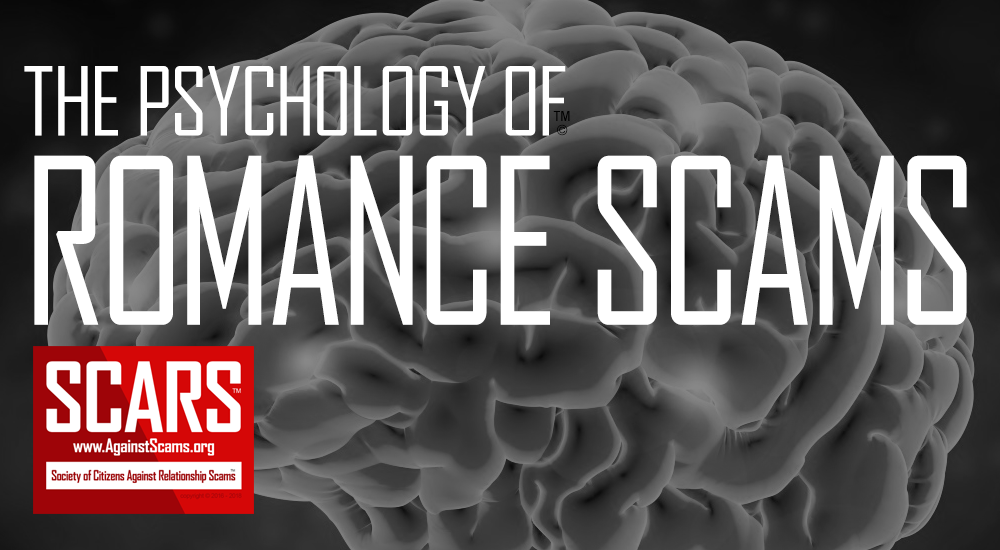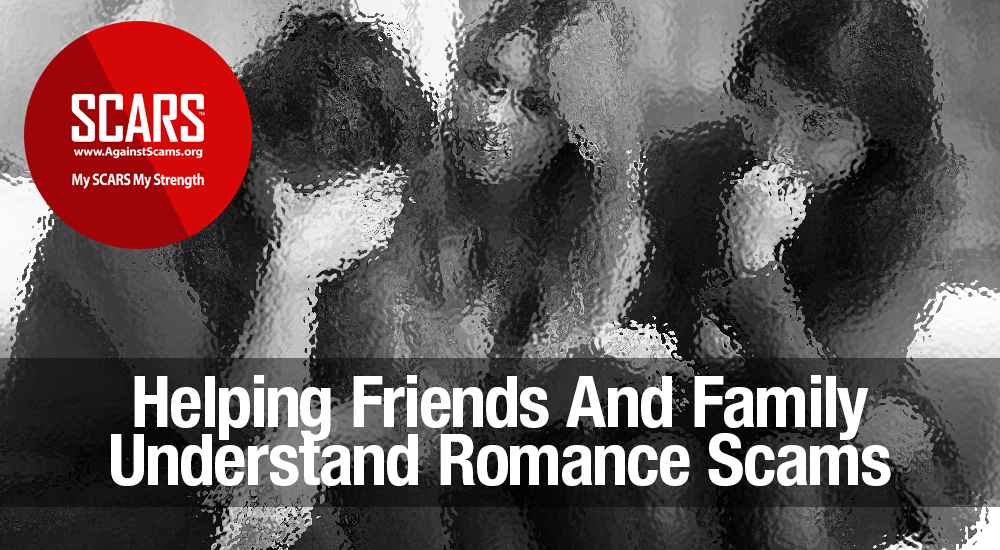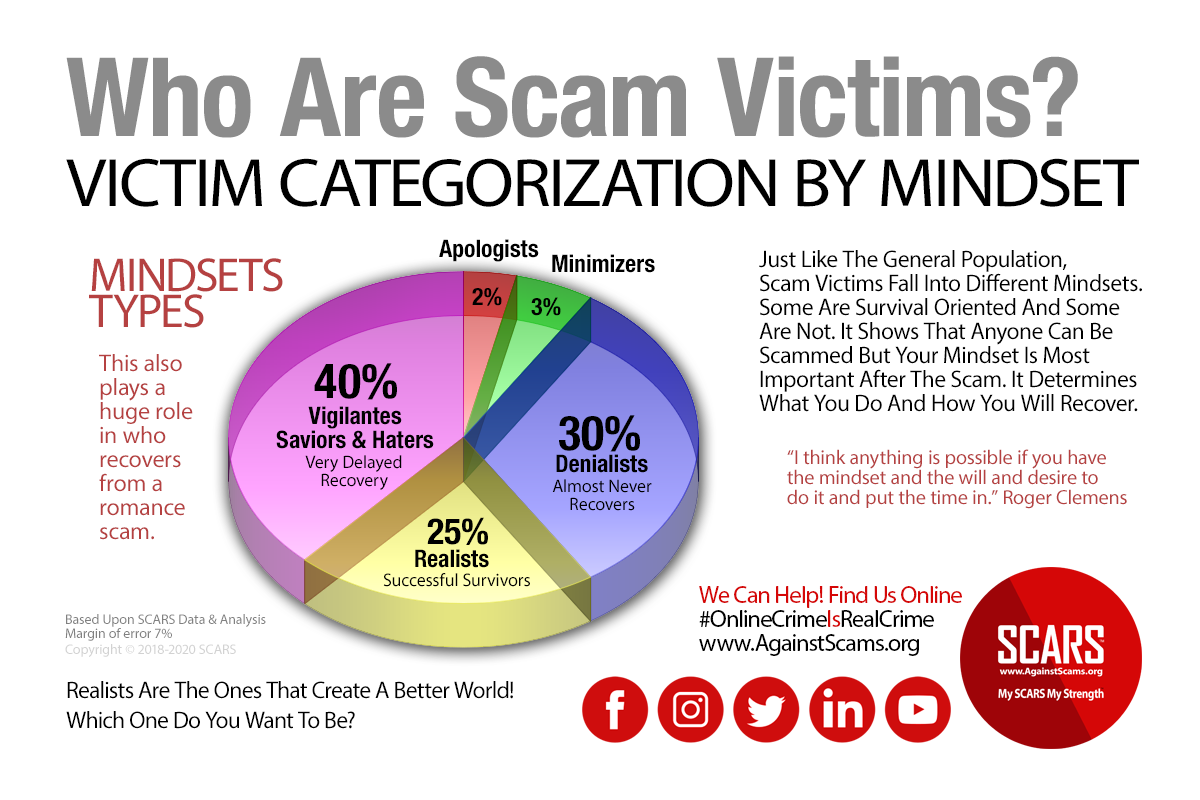
SCARS Institute’s Encyclopedia of Scams™ Published Continuously for 25 Years

Helping Friends & Family Better Understand Romance Scams
Free Guide by the Society of Citizens Against Relationship Scams [SCARS]
This Guide is intended for Family and Friends of someone that was involved in a Romance Scam
Also available on LinkedIn.com here »
Introduction
This is presented in the hope that it will help scam victims to explain what happened to them. We hope that by reading this you can understand that the victim was not at fault but was professionally manipulated beyond their will and control.
If you are a victim, we encourage you to share this guide with your friends and family so that they can understand what happened to you. This way you don’t have to explain the “how” and the “why” – this guide will do it for you, just the “what” if you choose to.
If you have experienced a romance scam or know someone that has and are seeking help or would like more information, call please visit our other educational and support information here on our website www.RomanceScamsNow.com or our pages on Facebook and other social media.
Understanding How It Happened?
A Romance Scam Is An Unusual Crime. It Starts With Just Saying Hello.
The internet was conceived as a place for all of us to come together, connect with new people, people from all over the world. We could learn about each other’s cultures, lives, and histories, and make the world a smaller happier place. Or so went the theory.
We all know that there are dangers out there, from viruses and malware to pedophiles that stalk their victims online. The old MySpace collapsed because it became a “grooming ground” for Pedophiles until the Federal Trade Commission stepped in and forced it to change. Sadly, that was just one chapter in the long history of crime online. Fast forward to the present, and we now see a situation where organized global criminal cartels are everywhere online.
But How Does It Happen?
It starts with someone sending a message or a friend request, they pretend to be someone that looks real and honest. Maybe a soldier overseas just wanting someone to talk to. Or a woman doing aid work wanting to talk with someone from home. It is a beginning that anyone could fall for and millions have. In the last 20 years, more than 15 million people have become victims of romance scams and another 10 million inside China. This is not a unique or isolated problem, yet few people really know much about these crimes are how people become victims.
Before you leap to any conclusions, such as that these victims are all stupid lonely people (which they are not), just understand that ANYONE can be scammed under the right set of socially engineered circumstances. Anyone! Intelligence is not a barrier either, smart people fall prey just as easily (maybe more easily) than dumb people. Skepticism or distrust is also no barrier or protection. Everyone can be scammed.
Steps To Doom
A romance scam starts with an inherent hard-wired willingness to trust strangers. Studies have shown that we all are more likely to trust a stranger over someone we know. [Learn more here] You probably have met countless strangers during your life and were inclined to initially trust them until proven otherwise. In the real world, we have the benefit of all of our senses to detect deception but online we have none of that, yet the same instinctive desire to trust is still at work. This is how the scammer gets through the door.
Once a connection takes place the scammer begins an innocent enough conversation that can go on for days. Getting to know each other just like two real people would do. Obviously being alone and lonely plays a role in this. The scammers do their homework and target people who appear to be of the right demographic and appear to be divorced or widowed – lonely people make easy targets. They also target age ranges that make them less tech-savvy and very overconfident – seniors and teens for example, but in reality, anyone at any age can fall for a romance scam – though about 60% of the victims are women.
The Hook
Once the conversation gets comfortable the fraudster begins to apply a technique that causes an automatic response – a bit like setting the hook when fishing. Wired inside our brains is the older and more primal part called the Amygdala. The Amygdala is responsible for our fight or flight response – our emotional reactions to day to day stimuli, and most people lose their thoughtful control when it kicks in. It happens to you too when you get mad and argumentative – it is your amygdala that has taken control – this is called an Amygdala Hijack [Learn more here »]
The scammer understands how to use this Amygdala Hijack to bypass rational thought by simply saying “I Love You.” The victim is already in a kind of friendly relationship and they are alone and lonely. For most people when we hear those words we feel good. But when you are in a relationship with the hope of something more those words are a trigger in the brain that causes actual chemical changes releasing hormones that are the most powerful drugs in existence, and it is all automatic and beyond our control. This cocktail of chemicals in the brain short-circuits a lot of our natural intellectual defenses. You probably felt that yourself when you fell in love hard for the first time? But this is not love in the purest sense, this is masterful manipulation.
Hard-Core Manipulation
Eventually, the brain’s chemistry begins to balance itself out – over the course of days, weeks, or months, and nagging questions start to surface. Scammers are far from perfect, they work in a high-volume business where they work on dozens of victims at a time. They organize themselves into teams to work their victims 24/7. So leaks and admissions or mistakes happen, and the victim will pick up on some of these naturally. However by this time they are preconditioned to believe the scam and the scammer(s). This is where another manipulative technique is employed, the same kind of techniques used by the CIA or MI6 to enhance control of captured spies or terrorists.
This is a technique that systematically shifts the thinking of the victim towards what the scammer wants – it is called “Gaslighting.” [Learn more here] Expert Gaslighting manipulates the victim into accepting the scammer’s lies and avoiding the search for the truth. Every battered spouse goes through this. Even people that have been cheated on have experienced some form of gaslighting. It is something that is real and works on anyone done expertly by the right person. These scammers apply this technique consistently over a long period of time that leads the victim into believing that their family and friends have turned against them and that they can only trust the scammer. The victim is deliberately isolated so the scammer can control them.
The combination of periodic restarting of the amygdala hijack and prolonged gaslighting can keep a victim captive for lengthy periods of time – from months to years. The victim will lose themselves and their connections to the people that could help them. They will gradually move into a world of the scammer’s making. Until something happens, usually they run out of money, then the truth is revealed. Once the victim learns the truth they crash and crash hard.
Who Is To Blame?
Who is at fault here? Certainly, the victim let the scammer in the door – how many times have we asked how that happened with other kinds of crimes? From fraud to rape to murder. We see in the news that they let their attacker inside. That is all (at least in part) because of our willingness to trust – that is why we have to tell our children over and over again not to talk to strangers. Our brains are not trustworthy, only hard-learned habits keep us safe.
It started with just talking with someone interesting online. It might have been a real person or a fake identity created by the scammer, but after that, the victim’s own brain worked against them controlled by serious manipulation techniques expertly applied by these large scamming cartels that train the thousands of people in their organization to do just that. But these techniques are not limited to scammers, boiler room telemarketers, politicians, advertisers, spies, police interrogators, they all use the same toolbox to bend us to their will.
Your friend or family member who was scammed was trapped in a web so powerful that it catches the most skeptical of people as well as the most vulnerable. Are they to blame? Should they have known better? What were they thinking? These are all rational questions, but the fact is this was an irrational experience. It blended the most addictive chemicals known: endorphins, dopamine, serotonin, and oxytocin and others into a stew that trapped them and allowed the scammer to have control. It leaves them not really knowing how it happened. However, it was not their fault. Everyone can be scammed and to a lesser or greater extent, the same techniques would work on you too.
Immediate Concerns
In the period immediately following a romance scam, there are many concerns for the victim. This is a traumatic experience and these scams can leave the victim in shock and with symptoms similar to addiction withdrawal. Plus in many ways, this is like a psychological violation that can leave them in shock and disoriented – many victims describe it as though they had been raped (without the violence). It is important they recognize that they have had a romantic relationship and that its abrupt ending is no different than when any relationship ends, but in this case, it is compounded by the fact that the victim was lied to and manipulated both financially and psychologically. This can be a recipe for extreme instability and trauma.
During this period it is important to be supportive and watchful since romance scam victims take their lives every day. If you sense that they need help, try to get them on the phone with a crisis hotline (www.SuicideLifeline.org). These are staffed by professionals that understand how best to help people on the worst day of their lives.
In the immediate aftermath, many emotions are going to emerge. It starts with a mix of shock and disbelief (denial), with anger and rage thrown in. The victim (as a result of the Gaslighting) may have alienated themselves from family and friends so they may not know who they can trust now. Regardless of what was real or not these things have been wired into their heads and it takes significant time to de-program them.
Try not to focus on any money the victim has lost as this can only delay their reconnection with reality by causing avoidance of the truth. Instead, try to be supportive but recognize that they may need expert care. There are two primary types of care for them: crime victims’ assistance and support (which SCARS offers free of cost), or mental health counseling. Each has its merits and depends on the victim. Only about 30% of victims can use support groups as a path, the rest will probably need mental health support locally – you can learn about local options through your health care providers, calling local hospitals, or talking to your local police about crime victims’ assistance services in their community. But be careful, they remain vulnerable to persuasion and there are thousands of self-styled groups online run by other victims – just because someone has been through this hell does not make them qualified to help others.
Effects Of The Scam
If your friend or family member is still trapped in the scam you should also look at our Guide for Friend & Family Intervention here
After The Scam, There Are Many Effects. None Of Them Good.
In all such cases, it is recommended to seek professional help with your medical or mental health professional since these experiences can be profound and leave lasting post-traumatic stress disorder [Learn more here] or other mental health issues in their wake. You can help them understand that support and counseling are good things and these can help them recover.
Three Kinds Of Romance Scam Victims
About 30% of victims go into denial. They either pretend it did not happen or simply hide from the world. Sadly these do not recover or recover poorly. They can remain broken for much of their remaining life, staying disconnected from life, family, and friends. An effort will be needed and probably medical professional support required to bring them around. There are numerous inpatient and outpatient programs that might help them. We suggest consulting them for details of their programs and how best to help these victims. Also recognize that these victims are likely to have suicidal thoughts and care should be taken to be both watchful and supportive, but make sure they have access to a Suicide Hotline Number (www.SuicideLifeline.org)
Another 40% of victims will be in a state of anger or rage following the scam. This is a natural response since it helps to readjust the brain and break the relationship bonds that formed. Anger is useful up to a point, but that line is crossed at the point where it turns into hate or causes other potentially serious disorders. If the anger does not subside to a manageable level quickly (a couple of weeks) there should be cause for some concern.
The remaining 30% are what we call “Realists.” They can understand what happened to them and even though they are experiencing a wide range of emotions, they can begin to work their situation intellectually. They will display the need to truly discover what happened to them and how to resolve whatever their current situation is.
Financial Disaster
The average victim loses about $3,000 but some lose hundreds of thousands or over a million. Victims can lose everything they own to scammers. They empty their bank accounts, remortgage their houses, sell everything and send the money to the scammer. The victim may not even fully understand how much they lost and will need help to realistically assess the damage.
The one central fact is that their life will not be the same afterward. The average victim will need years to recover financial – typically about 4 years, but sadly some will have lost so much that their life will never return to what it was supposed to be. They will need help in seeking assistance and working through all of this, particularly given their mental state.
In all cases, encourage them to focus on themselves and do your best to support them.
Responding To The Aftermath
After the scam, several things are going to be obvious to you. That your friend or family member is going to be in serious distress and will be unable to really talk about what happened to them. A big part of the reason is they don’t understand it themselves. Why should they? They are not an expert in this type of crime. But they will definitely blame themselves.
They are going to need help in understanding how these scams work and the effects that it had on them. By better understanding the mechanics of what was done it will help them properly shift the blame from themselves and onto the criminals that did this to them. Yes, they opened the door, but as we said before, once the romance scammer was let in the door they lost control. By starting the process of learning what and how it was done to them they can reestablish a measure of control in their lives, and your support will be crucial in helping them.
The most important thing you can do following a scam is to let them know that you are there for them and you will help them to recover.
How You Can Help
After the victim discovered the scam there is a range of things that must be done and you can help!
The very first thing is to gather the evidence and preserve if for both law enforcement and tax purposes. You can help them understand this and perhaps do the gathering for them since facing the communications with their scammer may be difficult.
The next thing is to help them be sure that they have cut off all potential communication with the scammer. Remember that they were susceptible and some victims will actually miss the connection they had so much that they will return to the scammer, giving the scammer another opportunity to create a new fairy tale. Block the scammer everywhere, even going so far as to deactivate accounts (do not delete them – most social media platforms let you turn off an account). Also, recognize that they let the scammer into their world and that means the scammer might have made “friends” with other friends and family members so the alert should go out. The victim will be too embarrassed to admit this, so you can help.
The victim is going to need to report this to the local police immediately. The police may be reluctant since there is little or nothing they can do about it, but ask them to take an “Informational” police report so you can get a report number for banking, insurance, and taxes. This is going to be very difficult since not all police are sensitive to this type of crime but you can be the buddy that helps them get through it. Also be sure they report the scam into our global scam reporting network on www.Anyscam.com Reporting matters and you can help them understand that.
Next comes the financial issues. Banks and credit card companies must be contacted. If money was sent via a money transfer agent such as Western Union or MoneyGram call them with your police report number to see what can be recovered. If gift cards were sent (meaning the numbers were sent by email or chat) call the card company to see if a refund is possible. In most cases the money will be gone forever. This is a nearly $50 billion dollar industry worldwide.
After these, the next thing is to start to recover, to move the focus away from the crime and criminal, and towards their own emotional recovery. You can help them find local resources or suggest that they join one of our online support groups on Facebook or MeWe.com
Women vs. Men Victims
Women tend to be more reluctant to report their scams to family and friends, but if you can get them talking they have a better chance at recovery and a happy life. Men tend to be very angry that they were fooled.
You know your friend or family member and what their personality is like. Each person is different and how they process the scam is also different. Expect more anger form men – they will want revenge – which is absolutely the wrong thing since it prolongs the anger and turns it into hate. Men recover at a much slower rate than women. In fact, support groups usually fail for men and they will be better seeking professional counseling. Women, on the other hand, tend to do much better in a community setting, either in local support groups or in our online support groups.
Help them understand how important that this is and is not something to avoid. There is much to learn and a supporting group of other victims can help accelerate that knowledge and provide a lasting pool of people to help them in the hard times to come. While you can be a good friend or family member to support them, victims need to hear from others who have experienced that same thing.
Road To Recovery
The process of recovery for a romance scam victim is not fast. It will take months and sometimes years before the victim feels like a survivor and it is behind them. Some victims will think they are over it quickly, but this is just a form of denial. The only cases where they get over it quickly is where it never really took hold of them and lasted no more than a few weeks. Once the more serious manipulation was underway it was doing damage, and it will take time to heal that.
Have the victim read our Three Steps Guide for New Victims
Many people have a need to have it over immediately, but just like with addicts there is a process and if they follow it there can be a positive outcome, but if they break the process the outcome can be quite different and take much longer.
What Are The Key Steps Your Friend Or Family Member Can Take To Recover?
- Report the crime (local police, national police – FBI/www.IC3.gov, and SCARS) and block the criminal from all contact
- Gain control of the financial loss however bad that may be (the money is gone and they have to deal with that)
- Begin learning what happened and how (read reliable sources of information from ethical people online – not all are)
- Stop fixating on the scammer and the fake identity (they will probably never know who it was and an arrest is not likely soon – it will only lead to obsession)
- Have them join a support group and go to counseling (our support groups are safe private places offered free of cost)
- Be patient – this will take a long time but eventually, they can recover – they can get through this
What You Can Do To Help Others
Your friend or family member was a victim of a global criminal cartel with more than 100,000 scammers operating worldwide. You can help spread the word to everyone that you know about how these scams work and that anyone can become a victim. Did you know that 15-year-old girls are the fastest growing segment of victims (for both romance scams and sextortion)? No one thinks this can happen to them, but it can. Only by learning and changing habits can we all remain safe.
But you have to do your part. You have to talk about this with the people you know. Some are already victims and you just never knew, but by bringing it out into the light you can help them too. Most importantly you can play a role in keeping the rest of your family and friends from harm. Victims find it very difficult to do this, but you do not have the embarrassment or emotional trauma to prevent you from helping.
You can start by becoming a SCARS Member – just go to www.AgainstScams.org and lend your voice to our movement to stop these global crimes.
You can also donate to SCARS so that we can help other victims – just $5 is a way to help other victims – go to donate.AgainstScams.org to donate or learn more.
Questions And Answers
- Romance Scams are an international crime that usually involves a fake identity to fool a person into engaging in a massively manipulated romantic relationship.
- Romance Scams do not happen because the victim was stupid, they happen because the scammer socially engineered a set of conditions to trap the victim.
- Romance Scams can happen to anyone since it is based upon triggering the victim’s own brain against them then sustaining the scam through spy-craft style manipulation.
- Romance Scams don’t just happen to sad lovely people, they can happen to anyone, even people that are married – anyone can be scammed.
- Romance Scams victims cannot simply get over it, they involve deep-seated trauma that can result in PTSD or other disorders and professional help may be required.
- Romance Scams are a major challenge to law enforcement worldwide since it involves international treaties and extradition, and the host nations in Africa benefit from the influx of money.
- Romance Scams began in the early 1990’s and have grown into an industry rivaling the illicit drug industry, and they help support human trafficking and terrorism.
- Romance Scams require a globally concerted effort both at the grassroots level to help educate others, and at the governmental level to improve laws and treaties to promote greater enforcement.
- Romance Scams can be stopped with education and safe habits online, and the diligent efforts of people just like you!
About This Guide
This guide was produced by the Society of Citizens Against Relationship Scams [SCARS] a nonprofit nongovernmental organization based in Miami, Florida, U.S.A., with affiliations with the United States Department of Homeland Security, Department of Justice, and other entities worldwide. It is a registered online crime victims’ assistance and support organization. SCARS represents nearly one million victims worldwide with member groups in over 60 countries, plus has its own offices in in the U.S., Mexico, and China supporting romance scam victims worldwide
This guide was authored by Dr. Tim McGuinness, SCARS Director.
TAGS: SCARS, About Romance Scams, Friends & Family, Understanding Romance Scams, Information About Scams, Anti-Scam, Scams, Scammers, Fraudsters, Cybercrime, Crybercriminals, Romance Scams, Scam Victims,
SCARS™ Team
Society of Citizens Against Relationship Scams Inc.
A Worldwide Crime Victims Assistance Nonprofit Organization
Visit: www.AgainstScams.org
Contact Us: Contact@AgainstScams.org
PLEASE SHARE OUR ARTICLES WITH YOUR FRIENDS & FAMILY
HELP OTHERS STAY SAFE ONLINE – YOUR KNOWLEDGE CAN MAKE THE DIFFERENCE!
The Latest SCARS Posts:
FIND MORE SCAM NEWS
«SCAMCRIME.COM»
JOIN US ON FACEBOOK
«CLICK HERE»
END
MORE INFORMATION
– – –
Tell us about your experiences with Romance Scammers in our
« Scams Discussion Forum on Facebook »
– – –
FAQ: How Do You Properly Report Scammers?
It is essential that law enforcement knows about scams & scammers, even though there is nothing (in most cases) that they can do.
Always report scams involving money lost or where you received money to:
- Local Police – ask them to take an “informational” police report – say you need it for your insurance
- U.S. State Police (if you live in the U.S.) – they will take the matter more seriously and provide you with more help than local police
- Your National Police or FBI « www.IC3.gov »
- The SCARS|CDN™ Cybercriminal Data Network – Worldwide Reporting Network on « www.Anyscam.com »
This helps your government understand the problem, and allows law enforcement to add scammers on watch lists worldwide.
– – –
To learn more about SCARS visit « www.AgainstScams.org »
Please be sure to report all scammers
on « www.Anyscam.com »
Disclaimer:
SCARS IS A DIGITAL PUBLISHER AND DOES NOT OFFER HEALTH OR MEDICAL ADVICE, LEGAL ADVICE, FINANCIAL ADVICE, OR SERVICES THAT SCARS IS NOT LICENSED OR REGISTERED TO PERFORM.
IF YOU’RE FACING A MEDICAL EMERGENCY, CALL YOUR LOCAL EMERGENCY SERVICES IMMEDIATELY, OR VISIT THE NEAREST EMERGENCY ROOM OR URGENT CARE CENTER. YOU SHOULD CONSULT YOUR HEALTHCARE PROVIDER BEFORE FOLLOWING ANY MEDICALLY RELATED INFORMATION PRESENTED ON OUR PAGES.
ALWAYS CONSULT A LICENSED ATTORNEY FOR ANY ADVICE REGARDING LEGAL MATTERS.
A LICENSED FINANCIAL OR TAX PROFESSIONAL SHOULD BE CONSULTED BEFORE ACTING ON ANY INFORMATION RELATING TO YOUR PERSONAL FINANCES OR TAX RELATED ISSUES AND INFORMATION.
This content and other material contained on the website, apps, newsletter, and products (“Content”), is general in nature and for informational purposes only and does not constitute medical, legal, or financial advice; the Content is not intended to be a substitute for licensed or regulated professional advice. Always consult your doctor or other qualified healthcare provider, lawyer, financial, or tax professional with any questions you may have regarding the educational information contained herein. SCARS makes no guarantees about the efficacy of information described on or in SCARS’ Content. The information contained is subject to change and is not intended to cover all possible situations or effects. SCARS does not recommend or endorse any specific professional or care provider, product, service, or other information that may be mentioned in SCARS’ websites, apps, and Content unless explicitly identified as such.
The disclaimers herein are provided on this page for ease of reference. These disclaimers supplement and are a part of SCARS’ website’s Terms of Use.
Legal Notices:
All original content is Copyright © 1991 – 2021 Society of Citizens Against Relationship Scams Inc. (D.B.A SCARS) All Rights Reserved Worldwide & Webwide. Third-party copyrights acknowledge.
SCARS, SCARS|INTERNATIONAL, SCARS, SCARS|SUPPORT, SCARS, RSN, Romance Scams Now, SCARS|INTERNATION, SCARS|WORLDWIDE, SCARS|GLOBAL, SCARS, Society of Citizens Against Relationship Scams, Society of Citizens Against Romance Scams, SCARS|ANYSCAM, Project Anyscam, Anyscam, SCARS|GOFCH, GOFCH, SCARS|CHINA, SCARS|CDN, SCARS|UK, SCARS|LATINOAMERICA, SCARS|MEMBER, SCARS|VOLUNTEER, SCARS Cybercriminal Data Network, Cobalt Alert, Scam Victims Support Group, are all trademarks of Society of Citizens Against Relationship Scams Inc., All Rights Reserved Worldwide
Contact the law firm for the Society of Citizens Against Relationship Scams Incorporated by email at legal@AgainstScams.org
-/ 30 /-
What do you think about this?
Please share your thoughts in a comment below!
Table of Contents
- Free Guide by the Society of Citizens Against Relationship Scams [SCARS]
- A Romance Scam Is An Unusual Crime. It Starts With Just Saying Hello.
- But How Does It Happen?
- Steps To Doom
- The Hook
- Hard-Core Manipulation
- Who Is To Blame?
- After The Scam, There Are Many Effects. None Of Them Good.
- Three Kinds Of Romance Scam Victims
- Financial Disaster
- Have the victim read our Three Steps Guide for New Victims
- What Are The Key Steps Your Friend Or Family Member Can Take To Recover?
- You can start by becoming a SCARS Member – just go to www.AgainstScams.org and lend your voice to our movement to stop these global crimes.
- You can also donate to SCARS so that we can help other victims – just $5 is a way to help other victims – go to donate.AgainstScams.org to donate or learn more.
- Ethereum ETHM Token Trap and Pig Butchering Scams – 2026
- New U.S. Law – S.3643 – 118th Congress – Will Dramatically Impact Scammers and Terrorists – 2026
- How Scam Survivors Can Survive Valentine’s Day – 2026
- U.S. Veterans Benefits Scams – 2026
- New AI Voice Cloning Phone Scams – 2026
- An Essay on Justice and Money Recovery – 2026
- Tell us about your experiences with Romance Scammers in our
« Scams Discussion Forum on Facebook » - FAQ: How Do You Properly Report Scammers?
- Please be sure to report all scammers
on « www.Anyscam.com »
LEAVE A COMMENT?
Thank you for your comment. You may receive an email to follow up. We never share your data with marketers.
Recent Comments
On Other Articles
- on Love Bombing And How Romance Scam Victims Are Forced To Feel: “I was love bombed to the point that I would do just about anything for the scammer(s). I was told…” Feb 11, 14:24
- on Dani Daniels (Kira Lee Orsag): Another Scammer’s Favorite: “You provide a valuable service! I wish more people knew about it!” Feb 10, 15:05
- on Danielle Delaunay/Danielle Genevieve – Stolen Identity/Stolen Photos – Impersonation Victim UPDATED 2024: “We highly recommend that you simply turn away form the scam and scammers, and focus on the development of a…” Feb 4, 19:47
- on The Art Of Deception: The Fundamental Principals Of Successful Deceptions – 2024: “I experienced many of the deceptive tactics that romance scammers use. I was told various stories of hardship and why…” Feb 4, 15:27
- on Danielle Delaunay/Danielle Genevieve – Stolen Identity/Stolen Photos – Impersonation Victim UPDATED 2024: “Yes, I’m in that exact situation also. “Danielle” has seriously scammed me for 3 years now. “She” (he) doesn’t know…” Feb 4, 14:58
- on An Essay on Justice and Money Recovery – 2026: “you are so right I accidentally clicked on online justice I signed an agreement for 12k upfront but cd only…” Feb 3, 08:16
- on The SCARS Institute Top 50 Celebrity Impersonation Scams – 2025: “Quora has had visits from scammers pretending to be Keanu Reeves and Paul McCartney in 2025 and 2026.” Jan 27, 17:45
- on Scam Victims Should Limit Their Exposure To Scam News & Scammer Photos: “I used to look at scammers photos all the time; however, I don’t feel the need to do it anymore.…” Jan 26, 23:19
- on After A Scam, No One Can Tell You How You Will React: “This article was very informative, my scams happened 5 years ago; however, l do remember several of those emotions and/or…” Jan 23, 17:17
- on Situational Awareness and How Trauma Makes Scam Victims Less Safe – 2024: “I need to be more observant and I am practicing situational awareness. I’m saving this article to remind me of…” Jan 21, 22:55
ARTICLE META
Important Information for New Scam Victims
- Please visit www.ScamVictimsSupport.org – a SCARS Website for New Scam Victims & Sextortion Victims
- Enroll in FREE SCARS Scam Survivor’s School now at www.SCARSeducation.org
- Please visit www.ScamPsychology.org – to more fully understand the psychological concepts involved in scams and scam victim recovery
If you are looking for local trauma counselors please visit counseling.AgainstScams.org or join SCARS for our counseling/therapy benefit: membership.AgainstScams.org
If you need to speak with someone now, you can dial 988 or find phone numbers for crisis hotlines all around the world here: www.opencounseling.com/suicide-hotlines
A Note About Labeling!
We often use the term ‘scam victim’ in our articles, but this is a convenience to help those searching for information in search engines like Google. It is just a convenience and has no deeper meaning. If you have come through such an experience, YOU are a Survivor! It was not your fault. You are not alone! Axios!
A Question of Trust
At the SCARS Institute, we invite you to do your own research on the topics we speak about and publish, Our team investigates the subject being discussed, especially when it comes to understanding the scam victims-survivors experience. You can do Google searches but in many cases, you will have to wade through scientific papers and studies. However, remember that biases and perspectives matter and influence the outcome. Regardless, we encourage you to explore these topics as thoroughly as you can for your own awareness.
Statement About Victim Blaming
SCARS Institute articles examine different aspects of the scam victim experience, as well as those who may have been secondary victims. This work focuses on understanding victimization through the science of victimology, including common psychological and behavioral responses. The purpose is to help victims and survivors understand why these crimes occurred, reduce shame and self-blame, strengthen recovery programs and victim opportunities, and lower the risk of future victimization.
At times, these discussions may sound uncomfortable, overwhelming, or may be mistaken for blame. They are not. Scam victims are never blamed. Our goal is to explain the mechanisms of deception and the human responses that scammers exploit, and the processes that occur after the scam ends, so victims can better understand what happened to them and why it felt convincing at the time, and what the path looks like going forward.
Articles that address the psychology, neurology, physiology, and other characteristics of scams and the victim experience recognize that all people share cognitive and emotional traits that can be manipulated under the right conditions. These characteristics are not flaws. They are normal human functions that criminals deliberately exploit. Victims typically have little awareness of these mechanisms while a scam is unfolding and a very limited ability to control them. Awareness often comes only after the harm has occurred.
By explaining these processes, these articles help victims make sense of their experiences, understand common post-scam reactions, and identify ways to protect themselves moving forward. This knowledge supports recovery by replacing confusion and self-blame with clarity, context, and self-compassion.
Additional educational material on these topics is available at ScamPsychology.org – ScamsNOW.com and other SCARS Institute websites.
Psychology Disclaimer:
All articles about psychology and the human brain on this website are for information & education only
The information provided in this article is intended for educational and self-help purposes only and should not be construed as a substitute for professional therapy or counseling.
While any self-help techniques outlined herein may be beneficial for scam victims seeking to recover from their experience and move towards recovery, it is important to consult with a qualified mental health professional before initiating any course of action. Each individual’s experience and needs are unique, and what works for one person may not be suitable for another.
Additionally, any approach may not be appropriate for individuals with certain pre-existing mental health conditions or trauma histories. It is advisable to seek guidance from a licensed therapist or counselor who can provide personalized support, guidance, and treatment tailored to your specific needs.
If you are experiencing significant distress or emotional difficulties related to a scam or other traumatic event, please consult your doctor or mental health provider for appropriate care and support.
Also read our SCARS Institute Statement about Professional Care for Scam Victims – click here to go to our ScamsNOW.com website.
















![To Be A Scammer? An Overview Of Scammers Fraudsters & Online Con Artists - 2024 [UPDATED] what is a scammer what-is-a-scammer](https://romancescamsnow.com/wp-content/uploads/2021/10/what-is-a-scammer.png)
![New Research Study on Stolen Valor - Military Scams - STUDY NOW COMPLETED [UPDATED] Military Impersonation Research Study New Research Study on Stolen Valor - Military Scams](https://romancescamsnow.com/wp-content/uploads/2022/03/Military-Impersonation-Research-Study.png)







Thank you for a thought provoking article. It is wonderfully written so that friends and family members can get a better understanding of what happened and ultimately, we are not dumb!
This article is a great read for those who want to help a scam victim become a survivor.